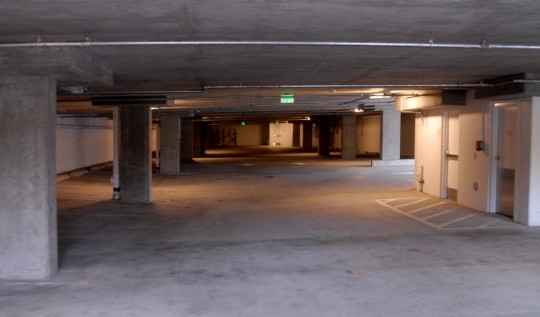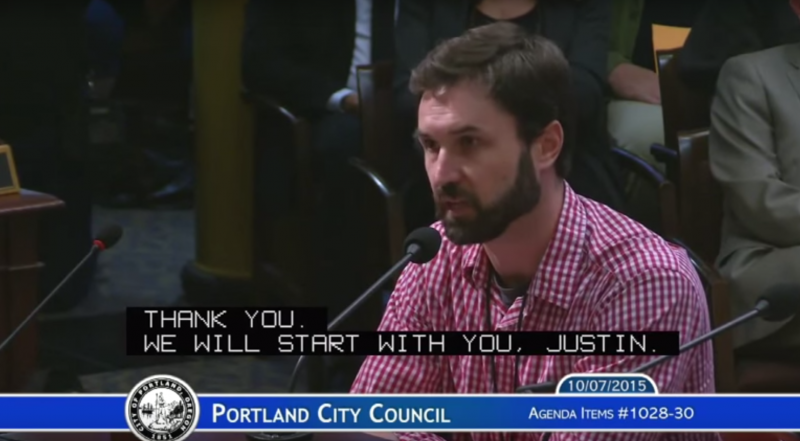(Video: City of Portland)
At City Hall on Wednesday, a searing picture of what it means to be a low-income renter, looking for space in Portland’s housing crisis.
At City Hall on Thursday, a seemingly earnest discussion of whether it’s fair to charge cars more than $0 for taking up space.
Nobody is claiming that an opt-in neighborhood parking permit system — the main measure the city is considering — is anything close to a solution for Portlanders searching for housing amid one of the country’s worst housing shortages. Still, it was odd this week to watch Portland’s City Council lament as if capitalism mandated that even the very poor must pay for 130 square feet of bedroom, and then 21 hours later debate whether the government should continue to guarantee free 130-square-foot parking spaces almost everywhere in the city.
The city is not debating whether to stop requiring driveways bigger than cars to be built into most residential lots, whether or not the person moving in is going to need them.
The city is not debating whether to stop requiring most new apartment buildings to include on-site parking whether or not there is lots of open space on nearby streets.
The city is not debating whether to require apartment landlords to charge for garage or parking lot spaces separately from rent.
The city is not even debating whether to force anyone to start paying a penny for a curbside parking space unless people who live in nearby residential zones vote for it.
All of those measures are seen, on some level, as politically impossible.

(Photo: M.Andersen/BikePortland)
It’s impossible, the thinking goes, to explain to the public (or maybe to politicians) that once you sweep all the details away, it just makes no sense to have a city where a particular type of expensive machine can almost always be stored for free but every other object in society — refrigerators, bookshelves, toilets, grandfathers — is expected to pay market rate for the space it takes up.
It’s impossible, the thinking goes, for the public to understand that when the government offers free or cheap on-street parking, four dumb things happen simultaneously:
• Tenants park on the street instead of paying landlords what it costs to build on-site garages, so landlords distribute some or all of the cost of those parking garages among every tenant in the building, driving the price of new housing units up as much as 63 percent.
• If the rental market won’t bear those extra costs, then the building never gets built.
• Subsidized parking makes people own more cars, which drives up the price of building new homes, which further reduces the number of places where additional homes can profitably be built.
• The physical space required for all those cars to park for free, both on the street and almost everywhere else they go, pushes everything further from everything else, making it almost impossible to create more of the dense, walkable, pre-automotive neighborhoods where low-car life is actually viable. As the country’s population rises, the pre-automotive neighborhoods that remain are continuing to get scarcer.
Advertisement
Instead of trying to explain these admittedly complicated ideas — or even the simple but foreign-sounding notion that a parking space is real estate in exactly the same way that a bedroom is — Portland is trying to explain one thing.
It’s trying to explain that if you don’t want it to be annoying to find a parking space on your street, one alternative is to to start charging people money to park there.
Every other option leads in only one direction: even higher housing prices.
Fortunately, the Portland City Council’s work session on parking yesterday offered some hope that Portland’s staff and city council understands this. Here’s paid-parking and housing-affordability advocate Tony Jordan, tweeting from the work session about the manager who’s overseeing the city’s modest parking reform effort:
"Managing the system badly is NOT an equity strategy." Excellent point from Judith Gray #pdxparking
— Tony Jordan (@twjpdx23) October 8, 2015
Here’s Jordan on Transportation Commissioner Steve Novick’s understanding of parking economics, spelled out most famously by UCLA professor Donald Shoup:
.@NovickOR is a total Shoupista. He gets it. Can he steer smart policy through the political process? I hope so. #pdxparking
— Tony Jordan (@twjpdx23) October 8, 2015
From comments at the session, it’s clear that Mayor Charlie Hales is on board with this very modest measure of giving neighborhoods the option to vote on whether to start charging for overnight parking on residential streets.
It’s also clear that Commissioner Amanda Fritz is uneasy about any changes to the parking status quo. In this exchange with Novick, she argued that the city should issue more street parking permits in neighborhoods than its streets have room for, because she sees that as a way to let residents decide their parking fate.

(Photo: J.Maus/BikePortland)
As is often the case on transportation issues, Commissioners Nick Fish and Dan Saltzman are the swing votes.
Though a sensible parking system is just one of many, many measures that could help fix Portland’s housing crisis, one wonders whether Fish and Saltzman see any connection between Wednesday’s discussion of Portland’s shortage of space for people and Thursday’s discussion about its continuing policy of guaranteeing free space to cars.
Correction 10/12: A previous version of this post said the city requires most single-family residential lots to build space for two cars. In most cases, the city requires space for one car plus an additional 10 feet.




